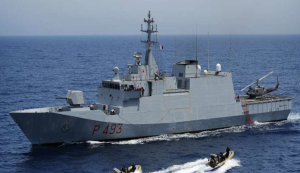
According to the Israeli plan, the electrical systems and the hull of the German-made corvette warships will be built at the shipyard, while the combat systems will be installed once the ships are delivered, by 2020.
By i24news
Israel has huge and mostly untapped gas fields that cover some 23,000 square km (9,000 square miles) of sea — more than Israel’s territory on land.
Israeli planners see possible sea-borne or rocket threats to gas facilities from Hezbollah guerrillas in Lebanon and Hamas militants in the Gaza Strip, making expanding the naval presence a priority for them.

Leviathan gas field in Israel – Photo: AFP
Israel’s navy chief, Admiral Ram Rotberg, said in a separate statement that the corvettes would be classed as “Saar 6″ missile boats — suggesting a major improvement in capabilities.
The ships, worth 430 million euros ($480 million), will be built by Thyssen Krupp and delivered within five years, providing significantly more fire power to Israel’s navy.
Israel’s navy has sent engineers to Germany to consult during the process of building ships that are expected to protect Israel’s natural gas reserves in the Mediterranean.
Israel’s Ministry of Defense agreed to purchase four ships from Germany in May to protect the natural gas platforms, including Tamar, a site which is already in use, and the much more extensive Leviathan site, which is being developed.
The German government will pay 115 million euros towards the cost. As part of its atonement for the Nazi Holocaust, Germany is committed to Israel’s security and has often helped pay in the past for the cost of military equipment such as submarines.
A senior Israeli officer in the Navy told Haaretz that after subtracting the grant given to Israel by Germany, the ships will cost Israel approximately $90 million. The Israeli engineers were sent to Germany last month.
According to the Israeli plan, the electrical systems and the hull will be built in the shipyard, while the combat systems will be installed once the ships get to Israel. The officer said that one of the reasons why they planned to proceed in this way was because of concerns about possible boycotts against Israel in the future.
Discussing the war between Israel and Gaza last summer, the officer said that “The subject of the boycott is becoming a trend that countries are being swept into.” During the fighting last summer, Britain reconsidered military export licenses to Israel and Spain declared that it would temporarily halt arm sales and military technology to Israel.
Thyssen Krupp also committed to buy 700 million shekels ($181 million) worth of Israeli goods under the contract.
“The deal signed today is an event of the utmost significance that dramatically upgrades the navy’s capabilities of defending the State of Israel’s strategic sites in the gas realm,” Defense Ministry director-general Dan Harel said in May, adding that Israel’s economy would also be buoyed.
According to the navy website, its biggest warships are currently “Saar 5” missile boats. Israel’s Channel 2 TV news said the Saar 6 vessels would be significantly larger, with twice the operational range of the Saar 5 class.
View original i24news publication at:
http://www.i24news.tv/en/news/israel/diplomacy-defense/83608-150827-israel-sends-naval-engineers-to-germany-to-help-in-ship-deal







 Israeli New Shekel Exchange Rate
Israeli New Shekel Exchange Rate